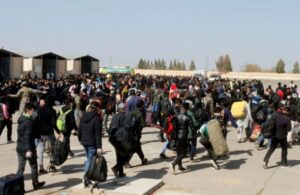KABUL (SW) – Despite numerous challenges and restrictions, at least 22 women poets and writers from across Afghanistan in a series of interviews with Salam Watandar, said they continue to highlight the plight of the females through their writings and poems.
Although most of these women said that they face social obstacles and challenges, but the themes of their artistic works remain focused on the issues of women and girls. These women say that they express the pain, despair and unspoken feelings of women whose voices have been silenced and who have experienced countless challenges in life.
Salam Watandar interviewed 22 women poets and writers in 12 provinces with 2 from Nangarhar, 2 from Bamyan, 3 from Kapisa, 3 from Kabul, 2 from Badghis, 2 from Faryab, 2 from Badakhshan, 2 from Balkh and one each from Takhar, Logar and Kandahar provinces.
Although they consider the role and presence of women in literature important, but some of them say that women poets and writers do not receive much support from the de-facto government or from the people in society.
Shamila Nabi from Kapisa province, who has been writing short stories for 14 years, says she uses her stories to highlight the challenges faced by the Afghan women.
She describes writing as a struggle that involves falling, rising, facing challenges and expressing not only oneself, but all people, especially women. “My motivation for writing such topics is the courage of Afghan women in fighting against their problems in life and society and how they fight and stand, and this makes me very, very easily motivated to write about women. In general, most of the stories I wrote were about women and a large percentage of my writings were devoted to wome,” Shamila added.
In a section of her story, ‘Women and Life’, Shamila writes about a woman who is not allowed to work by her husband and is restricted: “He raised his eyebrows and approached me with sharp steps, squeezing my cheeks with one hand and pulling my hair back with the other, saying in a voice through his teeth: jobs, jobs! Only when I am dead!”
She further writes: “I was just crying for the man I considered the piller of my life after my father, the man who had promised to support me all my life, he was shouting but I couldn’t hear anything.”
Similarly, Zakia Masumi, a female poet from Faryab province who has written about 50 poems so far, says she writes about various issues, especially women and about those whose voices have been silenced.
She explains: “The conditions in which Afghan women live have had a very negative impact on women’s psyche, women have lost all their hopes for the future. You rarely find a woman poet who does not talk about the suffering of the times, otherwise women always feel the injustices of society and their closest relatives has been hit and has always complained about inequalities.”
In addition, 12 of the women interviewed by Salam Watandar say they have faced social barriers and restrictions, discrimination in society and lack of appreciation for their works and writings.
Elhama Nusrati from Badakhshan, who writes short stories and novels, says, “Obstacles are social restrictions and social discrimination, and family restrictions. As well as poor security situation.”
Serena from Kandahar, who is a poet, talks about the obstacles and challenges she faces: “I started writing poetry when I was 15 years old. My father is also a poet. I was supported by my family, but for now our society is patriarchal; they don’t value women so that women can write poetry and they support it. Poets also face economic hardships!”
Six women interviewed for this report said they could not publish their writings and works due to social restrictions and challenges, and in most cases they censored themselves.
Khatera Sadat from Bamyan province, who writes mostly on literary projects, short stories and poems, explained, “The problems I see are self-censorship and no space is available so that we can at least display our writings through the media; for example an exhibitions, but unfortunately the support that should be given by the Directorate of Culture is not available. The situation is such that we cannot imagine a bright future.”
Najma Farahmand, a storyteller from Kabul, had similar views: “The problem is that women are not allowed to publish and cannot convey all the topics to the audience. One of my biggest problems was getting a license and I was trying to publish it in Afghanistan, but unfortunately I couldn’t because there were some problems.”
However, eight women interviewed by Salam Watandar said that after the recent political upheavals and due to the ban on education for females in the country, they have been able to escape domestic isolation and express their mental concerns in the past three years by writing and poetry.
Monira Noori, a resident of Kabul, who was a sixth semester student in one of the private universities, says that she turned to writing after the universities were closed to girls. “… in the society where I couldn’t study and work, I was confined to my house and this made me depressed, so I tried to be able to go to find a way to support, that’s why I turned to books and when I turned to books, my interest in writing gradually increased and I turned to writing,” said Monira.
Parwin Sadat, a writer from Bamyan, a 12th grade graduate who did not want to continue her studies, aadded: “One of my goals is to write about women, because women don’t have a good situation in the current environment, universities and schools are closed to them, and the exact situation of women in Afghanistan should be portrayed.”
However, women who are interested in participating in literary and cultural programs also say that the holding of cultural programs and appreciation of women poets and writers has decreased in proportion to the past, and the continuation of this trend will demotivate people and future poets and writers.
Masuwa Ahmadi, a resident of Kabul, feared: “In the past, we witnessed that many literary programs were held, women poets and writers were appreciated, and there were also literary associations where the works of women were unveiled, but currently, in proportion to the past, we are witnessing that it has decreased. Literary programs that used to be organised are not happening and if this continues, it is possible that no poet or writer will have the motivation to write.”
Women’s rights activists consider the role and presence of women in literature important and ask the de-facto government to support them and undertake programs for the further development of women poets and writers.
Women’s rights activist Wazhma Yaqubi, said, “Unfortunately, in addition to the lack of support, the government imposes restrictions on poetry and literature. I think that if this procedure continues, it means that everything, especially poetry and literature, is about to be destroyed.”
Sosan Khaliqyar, expressed dismay over the situation, “As a supporting government, it must encourage artists or people who want to show the voids of society by using their art, and they should make the space more and more open, not narrower, and on the contrary, they should make plans for the promotion of it so people are encouraged to do more activities.”
Despite all this, officials in the Ministry of Information and Culture of the de-facto government say that they support the works that are in the interest of the society and the people and provide the basis for their publication.
Atiqullah Azizi, the director of art and culture in the Ministry told Salam Watandar: “They have exhibited their works in various programs and many circles were organized for them. Also, women can register their works in the culture and art section of the cultural awards competition program held by the Ministry of Information and Culture every year. The writings from the female category that are beneficial to our society and nation, we try to provide the necessary conditions for their display, printing and distribution.”
Women poets and writers, in their writings about the challenges of women and girls, say that after recent political upheavals in the country, schools and universities have been closed to girls and a number of work restrictions have been imposed on them.






